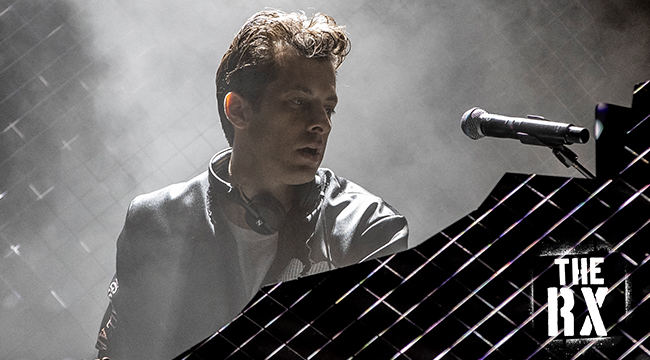
The RX is Uproxx Music’s stamp of approval for the best albums, songs, and music stories throughout the year. Inclusion in this category is the highest distinction we can bestow, and signals the most important music being released throughout the year. The RX is the music you need, right now.
On what is actually the fifth(!) album for a musician who has made his name as the go-to producer, songwriter, and collaborator for other stars, Mark Ronson all but continues to play that role on Late Night Feelings, a record defined by a slew of features. Like most Ronson projects, the album includes top-tier talent like Miley Cyrus and Camilla Cabello, but Feelings also spotlights indie icons such as Lykke Li and Angel Olsen, rising star King Princess, and the as-yet-unheralded gospel-pop purveyor YEBBA, who shows up on three separate tracks here. Soon, she will be heralded, her voice is like the whole hymn, no choir needed.
Regardless of the collaborator involved — and despite their stark differences, every vocalist here is a woman — all the songs tell the same story: one of the blues, a broken heart, and an ending that our hero hasn’t quite been able to accept yet. Introduced with the glitzy, galloping Miley runaway hit “Nothing Breaks Like A Heart,” Late Night Feelings rarely ever rallies to that tempo again, and even if that track comes squarely in the middle of the record, it’s flanked on either side by moody bangers. Which isn’t to say they’re all downtempo, even the throaty, faded vibrato of a singer like Olsen is accompanied by a drum machine and a fat bass line.
As most of us have been in pieces on the floor over a lost love at one point or another, the tracks are deeply relatable, and good at eliciting the same pathos they’re imbued with. And reportedly, all this pain is based on facts: Ronson and his wife of five years, Joséphine de La Baume, were recently divorced. Except, since none of it comes in Ronson’s own voice, it’s a little hard to connect these deep-seated emotions to the man himself. In fact, it’s hard to connect anything, really, to the man himself, except the qualitative excellence of any music he’s even tangentially involved in.
This isn’t necessarily a bad thing, but it is certainly a different strategy than the highly-personal, life-for-consumption methods that other majorly successful pop stars of our time have begun to employ. Perhaps channeling the pain through others is the closest Ronson can get to embodying a full-fledged pop identity himself. “I’m definitely not a pop star,” Ronson told The New York Times in a profile leading up to the release, which is not something most people feel the need to stipulate, but also is not the mindset of any pop icon worth their salt.
And despite winning Grammys (and an Oscar) alongside the likes of Lady Gaga and Dua Lipa, Ronson seems more than comfortable crafting music that appeals to his own sensibilities. If the rest of the world likes it is not what determines the music’s quality, and that is the kind of mindset where great art and pop music most often intersect. Late Night Feelings is the blues reimagined by one of the best pop minds of our time. The results are astonishingly futuristic, the album itself surprisingly cogent, another revelation given the scattershot feel of most of Ronson’s other solo records. (One is strictly covers; another, his debut, includes features from Ghostface Killah, Jack White and Weezer mastermind Rivers Cuomo)
“This is the first time, probably, people should be excited to hear the entire album, as opposed to like: ‘I can’t wait to hear that song at a party,” Ronson further told The New York Times of his new work. ”An entire great album gives you a place in people’s hearts.” It will probably take very few listens through of this record to make that place secure for pop fans, it is great in every sense of the word. From Diana Gordon, to Ilsey, to Alicia Keys, Ronson has a knack of knowing where voices should go, and which ones where.
Cabello’s placement, for instance, on the album’s best track “Find U Again” is totally unexpected and a bit unusual for her, but autotune and warped synths with a ‘70s sensibility fit the fiery young Latina better than anyone would’ve guessed. The other standout features Ronson’s own artist, Mikaela Strauss aka King Princess, who is the first musician he’s signed to his own label, Zelig Records, a Columbia imprint. “Pieces Of Us” pairs Mikaela’s conversational lyrical style with Mark’s signature funk, creating a Flashdance-era tune that’s mournful, nostalgic on multiple levels, and still impeccably catchy.
In telling the story of his own pain through the voices of ten different women, Ronson is also letting them tell their stories, each woman leaving a mark on the track, bringing herself into the narrative, and bringing the narrative into herself. “There’s no better way to channel pain than through women,” Li, who appears three times on the album, if you count the opener “Late Night Prelude,” told The Times. “[Ronson] surrounds himself with women, so I don’t think it was on purpose, but it was very natural. We’re his women and we know about the pain and about the love.”
Woman or not, anyone who hears Late Night Feelings is soon going to know, too. The question is, what to do with the knowledge?
Late Night Feelings is out now via Sony Music. Get it here.






